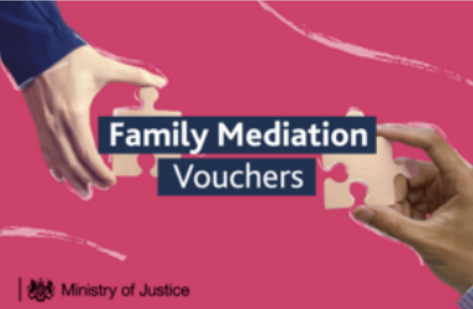Family mediation FAQ
What is family mediation?
Family mediation is a confidential, forward-focused process that helps separating couples resolve disputes around parenting, finances and property— without going to court. Family mediation also deals with wider family disputes such as grandparents contact, decisions on care of relatives and more. It’s quicker, more affordable, and less stressful than litigation. In most cases, you must consider mediation before applying to court.
What does a mediator do?
Our mediators are trained, FMC registered professionals, who:
Facilitate calm, constructive conversations
Help you explore options and reach fair agreements
Ensure both voices are heard
Provide legal information (but not advice)
Support decisions that work for your children and your future
They remain impartial and do not make decisions for you.
What is a MIAM?
The first step is to attend a Mediation Information and Assessment Meeting (MIAM) to find out if the process is right for you. You might be surprised to find it is – we know that where both former partners go and see a mediator for a MIAM, three quarters choose to go on to mediate, despite the fact that many don’t know anything about mediation before the meeting, or think their partner is so unreasonable that mediation will never work.
A MIAM (Mediation Information & Assessment Meeting) is your opportunity to meet with the mediator 1-2-1 for up to an hour and helps you:
- Understand the mediation process
- Share your situation and concerns
- Explore options for resolution
- Decide whether mediation is right for you
- Next steps
- MIAMs are required before most court applications. Learn more from the Family Mediation Council
What happens after the MIAM?
If both parties agree to mediate, we’ll schedule your first joint mediation session. Most families reach agreement within 2-4 sessions. If mediation isn’t suitable, we’ll guide you through alternative options including providing the necessary form/s for applying to court if required.
Do I have to mediate?
Mediation isn’t compulsory — but it is strongly encouraged. Before applying to court for issues involving children or finances, most people are legally required to attend a MIAM. This is a chance to explore whether mediation could help resolve things more constructively and cost-effectively than going to court.
At Brighter Future Mediation, we believe in empowering families to find solutions that work for them — not those imposed by a judge. Mediation offers a safe, confidential space to be heard, explore options, and move forward. Even if communication feels impossible right now, our experienced mediators are trained to support you through it.
You won’t be forced to mediate, but choosing not to engage without good reason could affect court proceedings, including potential cost orders. That’s why the government is offering £500 towards the cost of mediation in cases involving children to explore mediation first — it’s often faster, less stressful, and more child-focused than litigation
What if I dont want to be in the same room as my ex-partner?
All our services are fully online. Additionally we offer shuttle mediation when it’s not safe or comfortable for both parties to be in the same space. This might be due to past trauma, emotional distress, or safeguarding concerns. The mediator moves between separate spaces, sharing information equally and staying neutral. This approach helps reduce tension and allows each person to focus on finding a resolution at their own pace.
What is Child Inclusive Mediation (CIM)?
CIM allows children (usually aged 10+) to share their views with a specially trained mediator in a safe, separate meeting. After agreeing with the child what information can be shared regarding their views and wishes this become the agenda for the adult mediation sessions. This ensures decisions remain child-focused and supports healthier outcomes for families.
What is my ex has already contacted a mediator?
You may be invited to attend a MIAM. This doesn’t mean you’re committing to mediation — it’s simply a chance to understand your options and this step can save time and money.
Are agreements legally binding?
Not automatically. However, you can apply for a legally binding consent order through the court. We’ll guide you through this process and connect you with legal support if needed.
Can I get legal advice during mediation?
Absolutely. Many clients find it helpful. You can:
- Speak to a solicitor at any stage
- Get affordable advice via Advicenow
- Contact Citizens Advice or your local law centre
- Check out our recommended providers who share our values around affordability and accessibility.
When shoud I seek legal advice?
Legal advice is helpful when:
- Making decisions with legal implications
- Reviewing proposed agreements
- Preparing consent orders or divorce papers
Read more about legal advice during mediation.
Can my solicitor attend mediation with me?
Yes, we offer hybrid mediation, where solicitors join sessions. This is especially useful for financial matters and can speed up resolution. Ask us if this option suits your case.
What if we can't agree?
If mediation doesn’t result in agreement, you can still take your case to court. However, over 90% of our clients reach resolution — well above the national average of 73% (Family Mediation Council, 2019).
What if my situation changes?
You can return to mediation to revise your agreement. If your arrangement is legally binding and not followed, enforcement through the courts is possible. Although, people tend to stick to arrangements when they’ve been involved in the decision-making process, rather than being ordered by a Judge.
Trustindex verifies that the original source of the review is Google. I wasn’t overly excited to try mediation. I’m fully intended to go to court but I had a really good experience with this service. My Mediator explained the whole process as we went through and to my surprise, we were actually able to agree a parenting plan.Trustindex verifies that the original source of the review is Google. I found it really easy to talk to Miam it was all made clear .. great help… Dealing with issues and firms I can’t fill out was made so much more easier with help from Rebecca, it’s fabulous to know Rebecca is on the ball , she’s brilliant , and explains so much thoroughly , I totally recommend her , although things are not solved as of yet , she has done more for me than my last solicitor that cost Thousands of pounds …Trustindex verifies that the original source of the review is Google. After struggling to have a relationship with my grandchildren I was told about mediation. Had a great experience with Brighter Future, we just needed someone neutral to help things along. Special thanks to Davina, amazing mediator!Trustindex verifies that the original source of the review is Google. Thank you for giving me hope at a really bad time. I was dreading mediation but our mediator was fair and guided us both through the sessions. I managed to avoid court and things are so much better. I appreciate everything you did for me.Trustindex verifies that the original source of the review is Google. Brighter Future Mediation made a difficult time so much easier. The team was supportive, listened to my concerns, and helped us find a solution that puts our child first. Communication has been much easier since. I’d highly recommend them to any dad who felt stuck like I did.Trustindex verifies that the original source of the review is Google. I went for a MIAM meeting and had a really positive experience. Unfortunately mediation wasn’t suitable in our case but it was the first time I felt supported. I had support to complete my court form and feel clearer about what to expect.Trustindex verifies that the original source of the review is Google. I had a great experience of the service after calling around a number of places that didn’t even get back to me! Margaret was like a breath of fresh air, everything was explained and I was seen for the initial meeting the same day. The mediator was understanding and knowledgeable and gave me all the information I needed to take the next step. Really appreciate your help and that you went the extra mile.Trustindex verifies that the original source of the review is Google. After my divorce, I didn’t know where to start when it came to sorting things out with my ex- especially around our finances. A friend recommended them, and I’m so glad he did. From the first session, I felt like I was in safe hands. Our mediator helped us talk through the issues without arguments or blame. It wasn’t an easy thing but I finally felt heard.Thanks to Brighter Future, we’ve come to fair agreements and I can move on.Trustindex verifies that the original source of the review is Google. I was overwhelmed in the midst of a really tricky divorce when I reached out to Brighter Future Mediation. From the first call Rebeca helped me regroup, understand my options and the mediator guided us through the process. We were able to settle on finances and the kids and used their legal team to draft the order, saving thousands in the process. It’s a relief! Highly recommend!Trustindex verifies that the original source of the review is Google. I had a very positive experience with this mediation service, even though — due to my personal circumstances — we weren’t able to proceed with mediation in the end. From the very first point of contact, the team was professional, supportive, and responsive. They handled everything with empathy and a calm, non-judgmental approach, which really helped during a difficult and emotional time. Although the process couldn’t go ahead in my case, I genuinely felt that I was in capable hands. I would highly recommend them to anyone considering mediation.Google rating score: 5.0 of 5, based on 18 reviewsVerified by TrustindexTrustindex verified badge is the Universal Symbol of Trust. Only the greatest companies can get the verified badge who has a review score above 4.5, based on customer reviews over the past 12 months. Read more










